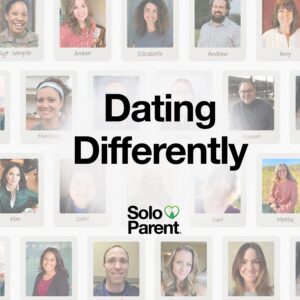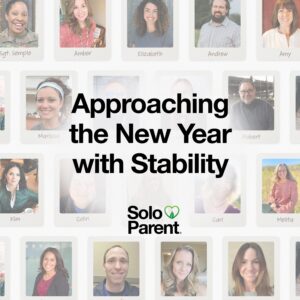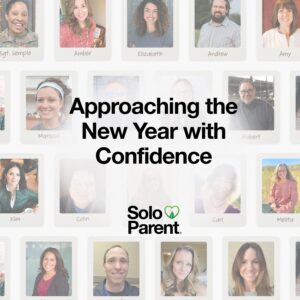Sometimes healing feels like walking through water—resistance with every step, the weight of it all pressing down. And just when you think you’ve found your footing, a wave hits and you’re back under. If you’ve ever felt that—like it’s two steps forward, one step back—you’re not alone. This is the rhythm of solo parenting. And believe it or not, even the steps back can be part of the healing.
So let’s talk about a framework. Not a formula, not a fix—but something we’ve developed after walking alongside thousands of single parents just like you. It’s called the Three Phases of Solo Parenting: Triage, Recovery, and Wellness.
We want to walk you through each phase by letting you hear from three parents—Cari, Andrew, and Lana—who have lived each one. These aren’t abstract ideas. These are real stories. And maybe they’ll help you recognize where you are too.
TRIAGE: When the World Is on Fire
When Cari’s “new life” began, she was a mom of three, a youth pastor’s wife, and completely unaware of the storm about to upend everything. Her oldest daughter came forward with the truth—her father, Cari’s husband, had been abusing her for years.
Everything changed in an instant.
What followed was a long, disorienting, painful road. Her church community didn’t rally around her. Instead, they turned their backs. She had no access to finances, no job that could support her kids, and was forced to flee her home for safety. She and her children lived with another family for six months, sharing one small room and storing their lives in laundry baskets.
Cari called that year and three months of her life triage. And it’s the right word. Triage is when you stop the bleeding. You don’t think five years ahead. You think about the next right step.
“Breathe deep,” she says to her younger self. “Focus on the next right thing.”
The pressure to be strong is enormous in this season. But strength doesn’t always look like charging ahead. Sometimes it’s being willing to ask for help. Sometimes it’s choosing to keep going when everything in you wants to disappear.
Cari’s advice? Let people in. Don’t wait for someone to guess what you need. “Hey, I need diapers.” “Could you just sit with me while I cry?” Those small asks create a circle of safety—and for Cari, they made all the difference.
RECOVERY: A New Normal Begins to Take Shape
Andrew describes recovery like this: “Some days I’m a C dad. Some days I’m an A-plus dad. I just hope there are more A-pluses than Cs.”
If you’ve moved beyond crisis mode but still feel like one gust of wind could knock you flat, you’re likely in recovery. It’s a messy in-between space—where you’ve got your feet under you, but you’re still learning to trust the ground.
For Andrew, the biggest shift was finding community. Other dads. Other moms. People who could sit with his pain without rushing him out of it. It gave him space to grow into the kind of father he’d always wanted to be. The kind who was present. The kind who made space for his kids’ emotions. The kind who could say, “Let’s go on a road trip,” and just… go.
Recovery isn’t glamorous. It’s not a highlight reel. It’s learning to live again—one day at a time, sometimes with therapy, sometimes with faith, often with tears, and always with grit.
WELLNESS: The Room to Dream Again
Lana didn’t even know how to dream anymore. A widow raising two boys, her energy was consumed by survival. Parenting. Doctor’s appointments. Grief. But when her boys moved out and the house went quiet, she looked up and realized—this was her moment to ask, “Now what?”
Wellness, for her, started small. Learning how to retile a shower. Flying across the country to a Solo Parent event. Scheduling lunch with a girlfriend. These weren’t grand gestures. They were baby steps. But they were hers.
Wellness doesn’t mean everything’s easy or healed. It means you’re growing. It means you know how to rest, how to reach out, how to take yourself on a walk or buy yourself the gluten-free dessert. It means you’ve found rhythm again.
And maybe most importantly—it means you’ve realized you have something to give.
So Where Are You Right Now?
If you’re in triage, survival is a win.
If you’re in recovery, presence is the goal.
If you’re in wellness, joy is the invitation.
Wherever you are, you’re not stuck. You’re not failing. And you’re not finished.
This journey is not a straight line. It’s a cycle, a spiral, a dance between grief and growth. You might feel like you’re in wellness one week and get pulled back into recovery the next. That’s okay. It doesn’t mean you’re broken. It means you’re human.
To help you figure out where you are, we created a short Solo Parent Wellness Assessment. It’s not a test. It’s a mirror—so you can see your own strength and take the next right step.
Click the link in the show notes. We’d love for you to try it.
And remember: There’s no finish line here. But there is hope. Always hope.



